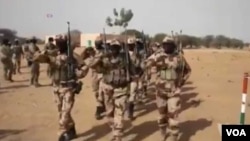The White House’s decision to send roughly 300 U.S. troops to Cameroon to help fight the Islamist extremist group Boko Haram has the support of some observers, though it also raised questions about might and motives.
Last week, President Barack Obama said the troops would provide intelligence and surveillance to an existing anti-Boko Haram task force created by Cameroon, Nigeria, Chad, Niger and Benin.
While some say the deployment doesn’t match the size of the threat, Christopher Fomunyoh, a Cameroonian and senior associate at the National Democratic Institute, thinks the force will make an impact.
“It’s not just a numbers game, but I think it’s the expertise that the 300 soldiers will bring … especially being able to collect intelligence on the movements on these extremists, sharing that intelligence with Cameroonian soldiers and making sure that it’s put to use in a way that can really curb Boko Haram and undermine its attacks on Cameroonians,” Fomunyoh said.
Serge Yondou, a former Yaounde University professor now living in the United States, said he’s pleased at the U.S. decision because “none of the countries can fight Boko Haram alone. Even if they pour all their resources together, those resources are not enough to fight such an asymmetric warfare.”
Eric Tchiage, a company director in Cameroon, expressed wariness about U.S. intentions. “We must not forget the states that come to help us have an interest in it," he said.
But Fomunyoh said that, given Boko Haram's repeated attacks inside Cameroon, “You can’t fold your hands and rely only on ideological reasons to say that Cameroon should not get direct assistance.… The test of this kind of assistance is going to be seen over time with the success with which this renewed effort can help curb Boko Haram attacks.”
Fomunyoh also said that Cameroon’s Rapid Intervention Battalion has received previous U.S. assistance and that this effort will enhance cooperation between the two countries.
Steve McDonald, a public policy scholar at the Wilson Center in Washington, said he supports the U.S. deployment but realizes the U.S. military's Africa Command, known as AFRICOM, usually gets a mixed reaction on the continent.
“Obviously, there are both individuals and governments like South Africa and others who are suspicious and not supportive of AFRICOM and direct American military action in Africa," McDonald said. "This has been apparent since the introduction of the U.S. Africa command back in 2007.”
But he also said there’s growing understanding of the role AFRICOM can play to improve security in the region, especially given a multinational threat like Boko Haram.
McDonald also points out the U.S. and its regional partners are dealing with deep-rooted issues that require solutions broader than just military. “Extremist groups have historically succeeded because people have felt marginalized and dissatisfied with their governments topped with vast under development and poverty,” he said.




